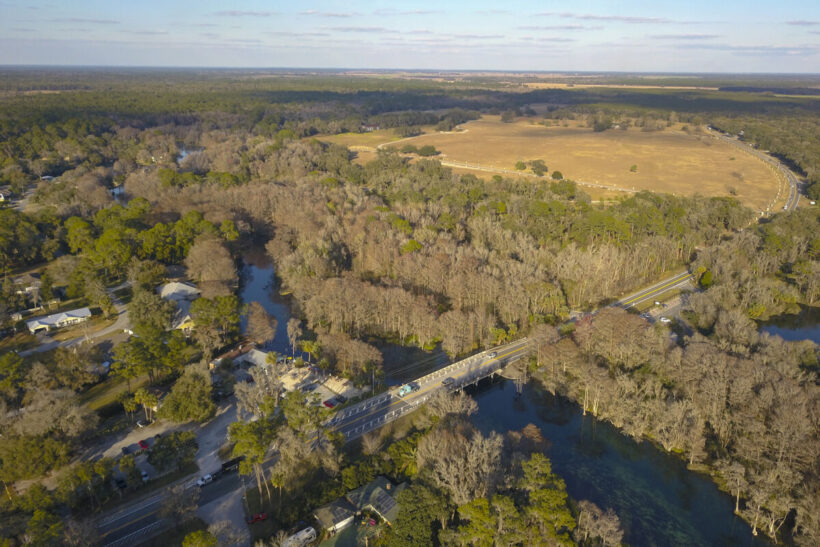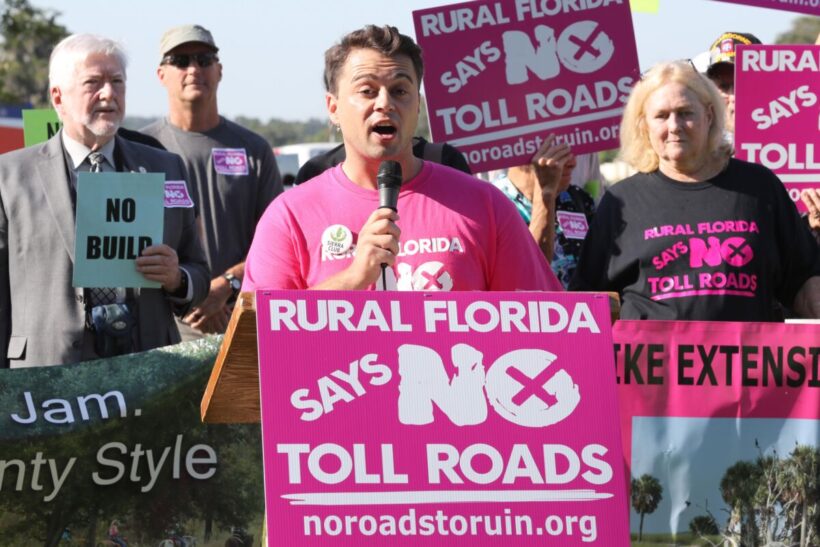10 stories that shaped Ocala in 2022 (Part 1)
The new year is right around the corner, but before we usher in 2023, let’s review the Ocala Gazette’s staff picks of the Top 10 Stories that shaped Ocala in 2022.
1. A fight for farmland
Residents of rural northwest Marion County and the conservation group Save Our Rural Areas (SORA) tenaciously fought against proposed projects within the Farmland Preservation Area (FPA) and outside the Urban Growth Boundary (UGB) this year, ultimately filing lawsuits to stop two massive developments from proceeding after the Board of County Commissioners approved them.
On March 1, the commissioners approved a rezoning request by B. Smith Hialeah, LLC., for the 453-acre Sunny Oaks Regional Activity Center PUD on County Road 318, just east of Interstate 75 and across from the Petro Travel Center. The project would virtually surround Black farmers who have lived and worked their properties for generations with industrial warehouses.
Then, in a 3-2 vote on June 21, the commissioners approved the 1,029-acre World Equestrian Center (WEC) Jockey Club PUD, also on CR 318, but west of I-75. The property is owned by Golden Ocala Equestrian Land, LLC., which is owned by billionaire long-distance trucking magnates Larry and Mary Roberts of Ocala, the developers of the World Equestrian Center (WEC) Ocala.
Both approvals came despite vehement opposition by dozens of area residents and SORA during the public comment portion of the respective meetings, who said the projects would destroy the rural character of the FPA, while threatening wildlife and damaging the environment. Commissioners who voted yes said the projects would bring vital jobs and increase economic activity in the area.
The local nonprofit group Horse Farms Forever, whose stated mission is to protect the Farmland Preservation Area, acquiesced to one project and advocated for another, to the dismay of residents who felt betrayed by the organization.
Attorney Ralf Brookes, a land use expert, filed lawsuits on behalf of adjacent property owners, residents and SORA, in April and July, respectively, to stop the developments.
A formal administrative hearing on the WEC Jockey Club PUD challenging amendments that were made to the county’s Comprehensive Plan to accommodate the development is set for 9 a.m. Jan. 12-13. Court dates for the Marion County lawsuits had not yet been scheduled as of press time.
In an end-of-the-year move heralded as a victory for those trying to protect Marion’s rural character, commissioners on Dec. 20 vetoed a rezoning request for a PUD development on CR 318 in the FPA, nixed a proposed sand mine in Orange Springs, and one commissioner–Kathy Bryant, who voted against the CR 318 developments–asked her fellow board members to consider a pause on approving more development.
2. The on again, off again, on again Northern Turnpike Extension and the public backlash

Dunnellon City Council worried about the damage the proposed turnpike extension would cause for Dunnellon near the Rainbow River on Tuesday, February 1, 2022. [Alan Youngblood/Special to Ocala Gazette]
In a somewhat shocking announcement in early August, Florida’s Turnpike Enterprise, part of the Florida Department of Transportation, said it was pausing plans for a proposed Northern Turnpike Extension due to immense backlash from residents in Citrus, Levy, Marion and Sumter counties, and would instead shift its focus on improving the I-75 corridor.
Criticism of the proposed project also came from grassroots organizations, such as the No Roads to Ruin Coalition, the Southwest Florida Water Management District, and environmental groups including Audubon Florida that objected to the four potential routes publicized by FDOT that would extend the turnpike northwest from its end in Wildwood at I-75.
Multiple city councils and county commissions had also voiced robust opposition to the extension as well, joining the chorus of the “No Build” option that said each of the proposed routes would destroy crucial wildlife habitat and conservation lands, disrupt rural lands, and negatively impact the area’s vital natural water resources as well as area residents by bringing more traffic and more development.
However, the Marion County BOCC did not follow suit of their counterparts and instead expressed “a desire to have a seat at the table during the process.”

Michael McGrath of the Sierra Club talks as people hold signs during a “No Roads To Ruin” coalition from Citrus, Levy, Marion and Sumter counties press conference to talk about their opposition and fight against a Florida Turnpike extension outside of the Marion County Commission in the McPherson Governmental Complex in Ocala on Tuesday, August 16, 2022. [Bruce Ackerman/Ocala Gazette] 2022.
The Citrus County Chamber of Commerce, the Ocala Metro Chamber & Economic Partnership each expressed a willingness to assist FDOT in exploring the routes and the Citrus Chamber received backlash for their position from residents of their respective communities.
The proposed Northern Turnpike Extension is a result of legislation that repealed the 2019 Multi-use Corridors of Regional Economic Significance toll road mandate requiring FDOT to build three new turnpikes in 2023 while allowing the agency to evaluate a northern extension.
The planning phase for the extension began in Oct. 2021 when FDOT publicized the proposed routes and asked for community feedback. Roadway extension proponents, including Florida lawmakers, said it was needed to alleviate traffic congestion, address future growth concerns, and speed evacuations during hurricanes.
Two of the proposed routes cut north from Sumter County through portions of southwestern Marion County, a third was south of Marion Oaks, and a fourth impacted portions of Citrus, Levy and Sumter counties.
Although FDOT said it was shelving the four proposed routes for now to shift its focus to I-75 improvements, FDOT Secretary Jared Perdue, guest speaker at an annual summit held by Horse Farms Forever on Nov. 14 indicated the Northern Turnpike Extension was still in the agency’s plans. Work on the proposed extension, he said, will start up again in the “next year or so” with the agency re-engaging the potentially affected communities.
3. State Rep. Joe Harding, sponsor of the Parental Rights in Education Act, resigns House seat after indictment
Harding, an Ocala Republican and member of the state House since 2020, earned national attention this year as the sponsor of the controversial Parental Rights in Education Act, known by critics as the “Don’t Say Gay” bill. His rapid political rise ended on Dec. 8 when he resigned one day after he was arrested on federal charges of wire fraud and money laundering related to a COVID-19 relief loan program for small businesses.
The six-count grand jury indictment alleges Harding falsely claimed two defunct businesses of his–The Vak Shak Inc. and Harding Farms, LLC–were active in 2019 and 2020 to obtain more than $150,000 in loans.
Prosecutors allege the two businesses had been dormant from May 2017 through Dec. 16, 2020, and therefore had no employees or gross revenues for the 12 months prior to the COVID-19 disaster, a necessary element to qualify for the loans.
In announcing his resignation on his Facebook page, Harding, who was re-elected without opposition in 2022, said he wanted what’s best for Floridians, “And I believe their leaders need not be encumbered by distractions that are mine alone.” He added he had repaid “every penny of the loan I obtained, and I have done my best to cooperate fully with all authorities.”
The Parental Rights bill, which was supported by Gov. Ron DeSantis and signed into law March 28, prohibits discussion on sexual orientation and gender identity issues in K-3 classrooms. Opponents of the law say it creates a hostile environment for the LGBTQ community.
Harding’s trial is set for Jan. 11 at the federal courthouse in Gainesville. He has pleaded not guilty to two counts of wire fraud, two counts of money laundering and two counts of making false statements.
DeSantis has scheduled a March 7 special primary and a May 16 special election to fill the House District 24 seat.
4. City of Ocala’s fishy firing of its city manager, and a new legal team
In an unexpected move April 19, the Ocala City Council fired City Manager Sandra Wilson and voted in Pete Lee as interim city manager shortly afterward.
Council member Barry Mansfield made the motion to terminate Wilson, and he, Kristen Dreyer, who seconded the motion, and James Hilty voted to fire Wilson. Council President Ire Bethea and Jay Musleh voted no.
The sudden decision to fire Wilson took place at the end of the council meeting and the topic was not listed on the agenda, drawing criticism from Musleh who said it should have been scheduled for the next council meeting and listed as an agenda item. He questioned the timing of the discussion and why it was brought up at the very end of the meeting and expressed support for Wilson. Bethea also said he supported Wilson.
The surprise firing raised questions among Wilson’s supporters about why she was being dismissed after 22 years of combined service. Some suggested that certain council members knew in advance the dismissal vote was coming. Also, two prominent Ocala businessmen, Doug Cone and Rich Bianculli, board members of the Ocala Metro Chamber & Economic Partnership, showed up and took front row seats just as Mansfield brought up the topic of firing Wilson, leaving some to believe their appearance was not a coincidence.
Questions also arose about why Lee was picked over two other assistant city managers who had considerably more experience, leading some critics to conclude the “fix was in,” for Lee, widely seen as a friend to the business community.
The City Council officially hired Lee as city manager Sept. 7, without opening the position to outside applicants. Lee’s promotions in the year prior to becoming city manager increased his salary from $85,000, to $150,000, and finally $225,500 annually as city manager.
For her part, Wilson, who became the city’s first Black city manager in 2020 and was a city employee for more than 20 years, said she, “appreciated the opportunities that have been provided to me as a city manager of this awesome city.” In April, council members unanimously approved a payout of nearly $295,000 in severance pay to Wilson. Her salary was less than $240,000 but outstanding paid time off, administrative leave and other perks drove up the cost.
Leading up to Wilson’s dismissal, council departed from its 30-year history of automatically retaining the Gilligan, Gooding, Batsel, Anderson & Phelan, P.A law firm to serve as the City Attorneys and instructed city management to advise the council on the pros and cons of building an in-house legal department.
In the Feb. 1 workshop presentation led by then-City Manager Sandra Wilson, it included complaints from several city departments about working with the Gilligan firm, including concerns the firm was taking cases to court rather than seeking a settlement because doing so would increase billable hours. Concerns also included long waits for document and contract reviews and unanswered emails and phone calls, delays that department heads said hurt their units’ efficiency.
Concerns about conflicts of interest were also raised in the presentation, citing a Gazette report from December 2021 about how the firm inserted a conflict-of-interest waiver in its contract. The clause had not been discussed with the council or city manager when the contract was signed and only became public because of the Gazette story.
Attorneys Patrick Gilligan, Robert Batsel and Jimmy Gooding pushed back at two areas of the presentation: first, that it included concerns about the firm’s billing practices; and second, the suggestion of any conflicts of interest.
Council members hired attorney William Sexton as its new in-house legal counsel during a Sept. 1 special meeting. The city’s $1 million annual contract with the previous law firm ended on Oct. 31, however they continue to provide legal services under Sexton’s supervision.
5. Fire fee litigation
The eight-year legal battle over the City of Ocala’s fire service user fees finally began to get some closure in May of 2022 when Marion County Circuit Judge Robert W. Hodges entered a judgment ordering the city to issue $80 million in refunds.
The first refund checks began rolling out this summer to thousands of Ocala utility customers who for years had paid monthly fees that the court later determined were illegal.
The final judgment was a culmination of events that started in 2006, when the Ocala City Council decided to impose the fee on roughly 89,000 utility customers, prompting the 2014 class action suit that challenged the legality of the fee. Three appeals later, an appellate court ruled the fees were an illegal tax and directed the local trial court to enter a final judgment.
The city struggled to find the money, at one point even exploring bankruptcy. Ultimately, council pulled $20 million from reserves and took out a loan for $60 million. Millions of dollars in refund checks have already been issued and cashed; some people owed money cannot be located.
A second round of checks will be issued in 2023 so that the majority of the utility customers will receive 100% of what they paid in the illegal tax.
The city now must pay down a $60 million note.





